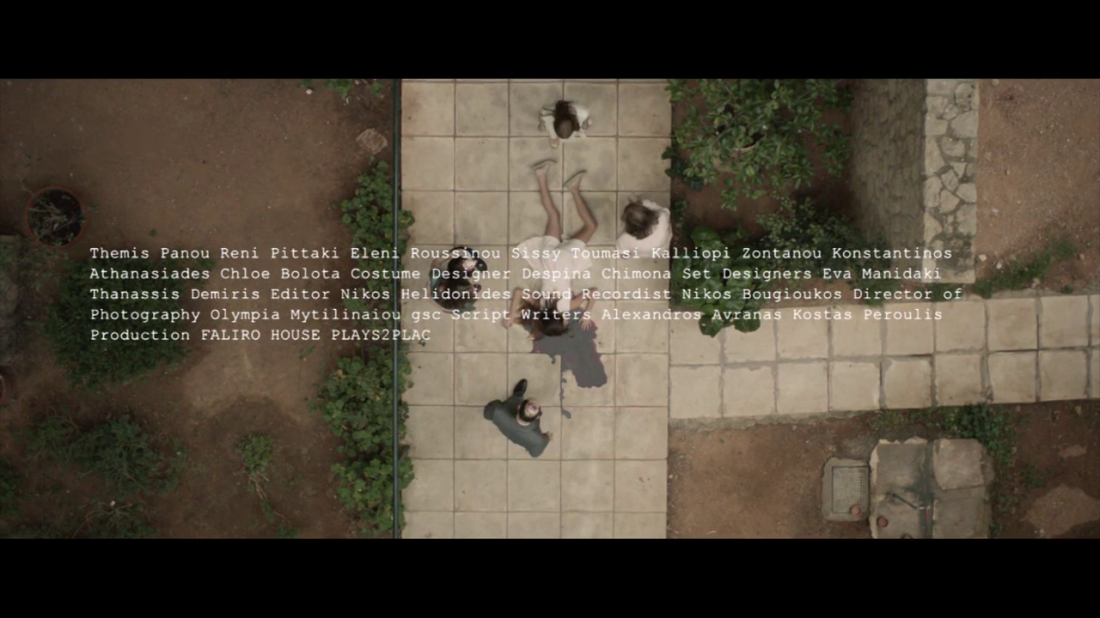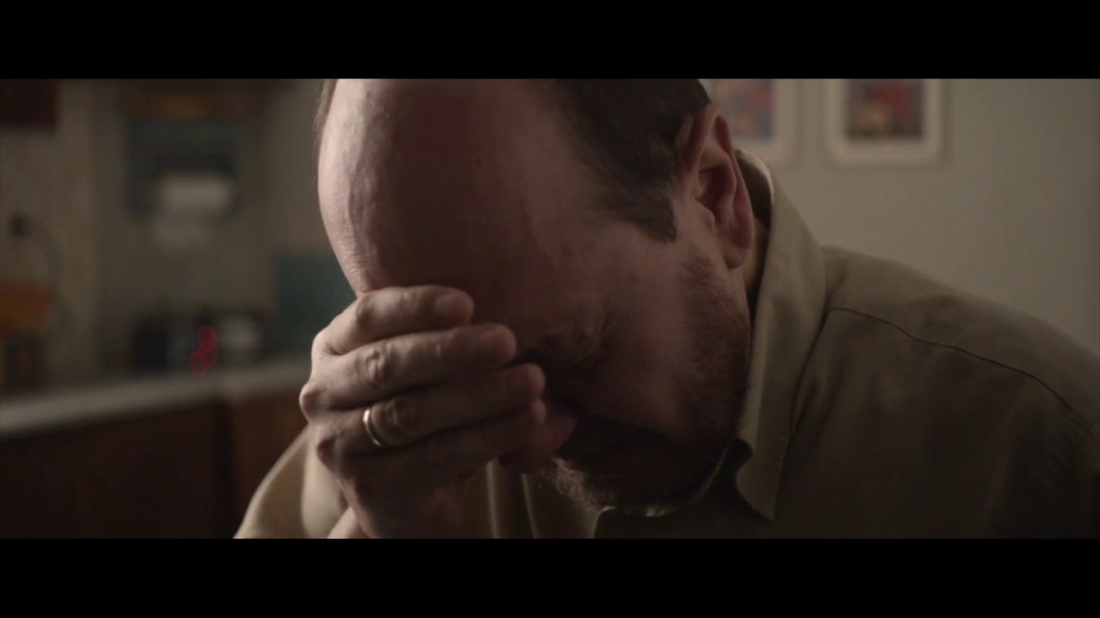Patriarchal Surveillance of Emotions Under Crisis in “Miss Violence”(2013)

In the more than memorable opening scene of Miss Violence, the camera opens on a closed door, opened by two girls, Angeliki and Myrto, discovering a surprise birthday party for Angeliki’s 11th birthday. Performing typical routines of a family birthday celebration, this family doesn’t seem too different from any other ones. However, this joyous façade is shattered when 11-year-old Angeliki, jumps off the balcony with a numb expression. Blood. Lifeless young body. Government agency investigation. Unflinchingly, Alexandros Avranas’s sophomore feature Miss Violence (2013) puts the audience in a state of crisis from the very start of the film. Incorporating realism, controlled performances and metaphor, Miss Violence dives deep into the mechanism of control that patriarchal structures employ when crisis occurs. To a certain degree, the suffocating structure of control in this family also mirrors the one in Greek society. This essay will focus on breaking down the patriarchal surveillance of emotions and emotional expressions under a state of crisis in Miss Violence.
Why would a 11-year-old girl choose to end her life on her birthday? A crisis is an indicator for far more, deeper problems. In “Sex, violence, dogs and the impossibility of escape: Why contemporary Greek film is so focused on family”, Tatjana Aleksic writes that “a crisis, after all, is not the root cause of negative social phenomena but rather a consequence of a pattern of behavior.” (157) Indeed, in the context of Miss Violence, this striking scene alarms the audience that something disturbing is going on inside the family, and Angeliki’s act of suicide is a reaction to the cause. The cause, as we learn later on, is the system of control within the family that grandfather has devised: girls will be pimped out after the 11th birthday to make money for the family.
If Angeliki’s suicide doesn’t automatically announce the state of crisis the family has entered, the film continues to set it up in a later scene where the grandfather (Themis Panou) goes to a government institution to declare Angeliki’s death. The government worker numbly tells him that his family will lose 170 euros due to the child’s death. Furthermore, in the later scenes, we see that grandfather goes to interview for a new job to take on after this incidence. Angeliki’s suicide puts the family into an emotional as well as financial crisis. Miss Violence reveals to us later that what this family has lost financially is more than the 170 euros – it has also lost a workforce, a child prostitute.
After the shocking opening scene, Avranas chooses to show family’s reaction to the audience from a bird’s eye view, framed in a wide shot. From this angle, all we see is characters’ body language and not the facial expression. The audience is put in a position higher, literally, above all the characters, which gives out a feeling of distance and indifference. We are not sure what the family members feel after seeing Angeliki’s dead body. In a way, this point of view emulates the system of crisis control portrayed in this film – cold, distant, and objective. The emotional impacts are minimized if not obliterated.

In Miss Violence, the grandfather is portrayed emotionally like a typical patriarchal male, “incapable of showing affection for his family but all the while being deeply concerned about its well-being”, (166) as Aleksic concludes in her essay. His approach of controlling the emotions of every family member after this traumatic incident happens particularly stands out with its striking similarities to real-life, world-wide government approaches in response to national crisis. Emotions are usually gendered as a feminine trait, and reasons are usually gendered masculine. The patriarchal ruler, whether the grandfather in Miss Violence or Greek government in real life, tends to force their own way of emotional crisis management onto everyone else – repression, manipulation, and silencing.
When the government welfare workers come to investigate the family, they comment on how strange it is that everything seems normal in the household after Angeliki’s suicide. Grandfather replies, “I tried very hard to achieve this.” This – a seemingly calm, placid surface, the grandfather would say, is the key to crisis control. The disembodied shots of his hand feeding Eleni pills, the supposed mother in the story, gives a glimpse of what it takes for this family to remain calm.

Although, this calmness manifests itself in unsettling ways. While understanding the level of shock the family must have been going through, the audience cannot help but ask a question – why is it that everyone else in the family is acting in such a tense, awkward way? Especially Eleni, why is she the way she is? The dinner scene right after Angeliki’s suicide attempts to give an answer to it. Eleni, Angeliki’s mother, is sitting alone on the couch. When asked by her father to join the dinner table with everyone else, she doesn’t respond. The film then cuts to her finally siting at dinner table. However, she expresses her discontent by pushing the plate away after her father serving her food. This minute rebellious act meets its immediate ramification – grandfather snaps at everyone at the table, and blames everyone harshly for Angeliki’s suicide. The dinner is then canceled. This scene illustrates Eleni’s rejection in participating in the highly performative act of solidarity – eating at the dinner table together as a family. Knowing how deeply broken this family is, Eleni acts against this surface-level performance of togetherness that grandfather puts on every day.

In another scene, when grandfather is informed by school teacher that Phillippos, the only boy in the family, is acting violent at school, he responds by asking Alkimi, the youngest, to slap Phillippos and “not feel sorry for him”. Not really having an option to say no, Alkimi does what she’s told. As she slaps Phillippos, grandfather is standing still in the background, next to Eleni, talking to Phillippos, “what kind of man are you, that let girls hit you?” As the camera spins around these two children, we as audience are as dizzy as they are, under the total control of this manipulative patriarch who tells them mixed information and repress their natural emotions of feeling sympathy. The links between family members are broken as they are not allowed to feel what they feel towards each other.
Throughout the film, editing, camera and sound design are used to emphasize the omnipresent surveillance of the father. For example, after the neighbor’s visit, Eleni locks herself in the bathroom and cries secretly. When she comes out of the bathroom, the film quickly cuts to a close-up, reversed shot of grandfather. We, like Eleni, are surprised to find out grandfather standing right in front of the door. He asks her “did you have a good time?” Eleni lowers her head in shame. She is punished for releasing her natural emotions. A sense of incarceration of emotions pervades the whole story. Now, the audience can understand the reasons behind the stiffness in Eleni, and other family members. When emotions are required to be locked inside, the display of anything can only be highly censored and thus contorted.
In “Sex, violence, dogs and the impossibility of escape”, Aleksic talks about the concept of “Oeudipalization”: “making the subject agree with and accept (desire) its own repression is thus the ultimate achievement of any stable society.” In Miss Violence, this is demonstrated through the (seemingly) stable family structure. Family members censor each other even in the absence of the patriarch, grandfather. A scene between grandmother and Myrto is particularly telling in how grandmother passes on the rule of silence and repression on to Myrto. When Myrto tries to tell her how she lied to grandfather, grandmother stops her and tells her she does not want to know. Myrto is discontent at how she cannot tell anything to her. Grandmother, in response, shows her the bruises and scars on her body.



Very occasionally, we see glimpses of genuine emotions revealed by characters. When grandfather sees the leftover birthday cake from Angeliki’s birthday, his hands tremble and he tears up. This is the only time he shows vulnerability in the film. This act is filmed with a extreme close-up, making the audience empathize with the grandfather. However, seconds after, he quickly collects himself, and the camera backs up to another room, framing him in the middle of the door frame. Then, the grandfather very suspiciously looks around to make sure no one has seen him cry. This voyeuristic camera framing appears quite frequently in the film to hint at the omnipresence of surveillance and self-surveillance. In the end, the patriarch who orders everyone to repress their emotions also deals with great difficulty repressing his own.

The ending of the film complicates this gendered discussion around emotion – is it the patriarch himself that patrols emotions? The grandmother who has murdered the patriarch is smiling at the children, yet she orders Eleni to “lock the door” – does the grandmother necessarily overthrow the authoritarian imprisonment of emotions after the end of the patriarch’s life? Or is she going to retain the legacy of the patriarch, upholding the same system? The deliberate ambiguity of the ending enables the audience to insert their own answers to this question, which allows the narrative to live outside of its specific Greek context, and into other cultures, and other people’s lives.
Works Cited
Aleksic, Tatjana. “Sex, violence, dogs and the impossibility of escape: Why contemporary Greek film is so focused on family.” Journal of Greek Media & Culture, vol. 2, no.2, 2016.